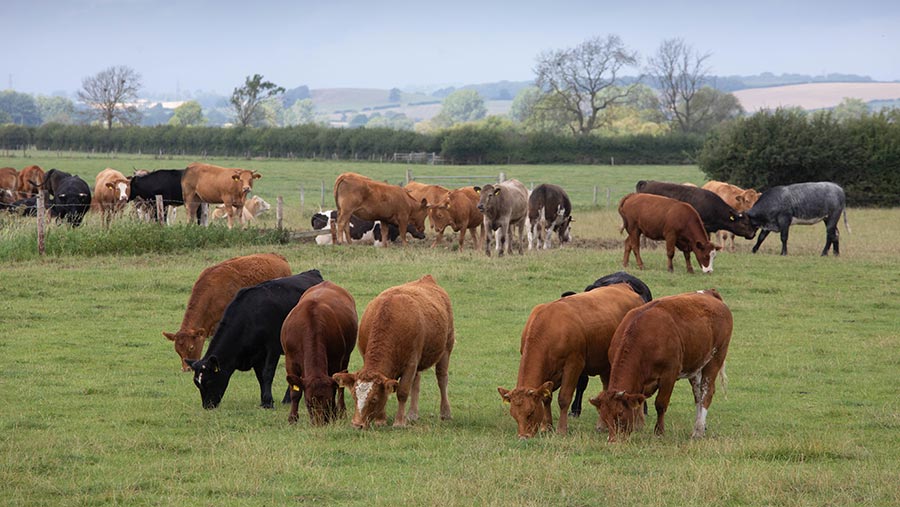Business Clinic: How much should I charge for store cattle summer grazing?
 © Tim Scrivener
© Tim Scrivener Whether it’s a legal, tax, insurance, management or land issue, Farmers Weekly’s experts can help.
Tom Hind, senior rural surveyor, Carter Jonas sets out the considerations when letting or taking grazing and housing.
See also: Business Clinic: peatland restoration schemes what to be aware of
Q: I am letting 10 acres of average-quality grass keep for 10 store cattle from April to September. The land is fenced, has water, and the stock owner will check the cattle.
What is the going rate for keep of this kind please? I would also be interested to know how much more to charge if checking the stock was my responsibility, what I could charge for wintering/housing and how that compares to sheep grazing.
A: Seasonal grazing is fundamentally a right to enter land and take a crop of grass in situ over an agreed period by means of livestock grazing. The grazier does not gain any other occupational rights.
The true value of grass keep is inherently difficult to determine, as it is the value of the grass consumed during the season, which is near impossible to predict at commencement when the licence is typically agreed. Seasons such as 2022 demonstrate this difficulty well.
Nationally, seasonal grazing can vary from free to £150/acre (for the season, typically from 1 April to 30 September), with leading rates exceeding this when supported by high demand.
On occasion, where onerous constraints or requirements exist over land – such as sites of special scientific interest or complicated stewardship agreements which require the land to be grazed – the grazier can actually receive a modest payment from the landowner.
Cattle grazing values
On average, the value of grazing lets intended for cattle will be higher than those agreed for sheep, loosely reflecting the higher standards of suitability (sward quality, gradient, fencing, ease of handling etc).
But there is rarely a differentiation made between types of livestock.
In your question, you mention that you have 10 acres of average-quality grassland. Depending on location, six months of summer keep could be expected to let for between £65/acre and £90/acre (of which £10-£15/acre is attributable to the troughed water supply).
On a weekly headage basis, this equates to £1.50-£2.50 a head for feeders, £2-£3 a head for stirks and £3-£4 a head for breeding stock.
Outwintering rates for cattle are usually agreed by discounting the expected summer grazing charge by up to 20%.
When applying these ranges to the land in question I would recommend you consider the following factors:
- Sward quality
- Fencing quality
- Grazing period
- Parcel size
- Fertilisers supplied/applied (if any)
- Topping by the landowner
- Water provisions
- Ability to cut and remove grass
- Access
- Stocking restrictions.
Where cattle are intended to be housed over winter, building hire will often be agreed between £1-£3/head a week (including water), depending on the building specification.
Shepherding responsibility
In terms of overseeing stock, any additional charge should ultimately reflect the cost of the landowner’s time in checking the herd and the value their stockmanship adds to the enterprise.
I recommend both parties pursue this structure with caution; if done incorrectly, the provision of labour could raise questions as to who the livestock keeper is and who should be responsible for keeping records, reporting movements, ear-tagging and providing public liability insurance.
While the summer grazing above would likely achieve the same level of rent if stocked by sheep, the national supply of steep hillsides, hay aftermaths and small unfenced swards widens the range of summer keep for sheep to £30-£80/acre without much competition from cattle graziers on land let for less than £40/acre.
Winter grass for sheep can vary vastly between regions, but generally follows summer rates less a 20% discount, with top prices being achieved from silage aftermaths and new leys.
Landowners looking to agist a flock onto cattle pastures over winter should proceed with caution as this can compromise the health status of both the herd and flock if not managed carefully.
Do you have a question for the panel?
Outline your legal, tax, finance, insurance or farm management question in no more than 350 words and Farmers Weekly will put it to a member of the panel. Please give as much information as possible.
Email your question to FW-Businessclinic@markallengroup.com using the subject line “Business Clinic”.
